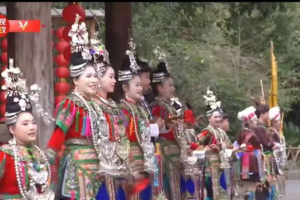
“As you drive into the city in the dead of night with the lights on, it’s a ghost town,” recalled Dr. Bruce Aylward of virus-hit Wuhan during a nine-day field investigation into the COVID-19 outbreak. “But behind every window and every skyscraper, there are people cooperating with this response,” continued the assistant director-general of the World Health Organization, before noting that China has demonstrated phenomenal collective action and cooperation spirit.
The Canadian epidemiologist accurately identified a key factor that has contributed to China’s successful containment of the virus. When faced with crises, people keep watch, depend upon each other, help each other and personal interests become public interests. These ideas are deeply rooted in traditional Chinese culture.
President Xi Jinping has advocated passing on traditional Chinese culture on numerous occasions and has committed to its integration into the country’s governance system, as well as building a community of a shared future for humanity. The way the nation fared through this pandemic provides a good example.
People-centered governance is one of the most valuable thoughts to emerge from the 5,000-year-long Chinese civilization. “The Book of Documents”, a Confucian classic, stresses that the people should be cherished as the people are the root of a country. “When the root is firm, the country is tranquil,” states the ancient text. This concept is followed by the ruling party of China.
During the pandemic, the president regularly
emphasized that “people’s safety and health always come first.” Traditional Chinese culture also advocates extending respect of the aged and love of children in one’s family to that of other families. No matter old or young, rich or poor, “life comes first” and this remained the golden rule in the nationwide fight against the coronavirus.
When treating patients in a critical condition, the first-class medical teams specifically worked out individual treatment plans. Among the more than 2,500 elderly patients aged over 80 in Wuhan, 70 percent were cured with the oldest aged 108.
As of April 6, the per capita treatment cost of critically ill patients in China exceeded 150,000 yuan (over 20,000 U.S. dollars). The individual cost of a few dangerously ill patients reached several hundred thousand yuan and more than a million yuan in some cases. All expenses were covered by the country’s healthcare insurance system and government budget. International observers have observed that these efforts would be unlikely to materialize in many countries.
Chinese Ambassador to the Untied States Cui Tiankai said that China has put people’s lives and health security first, paying special attention to vulnerable groups, such as the elderly, the impoverished and people with preexisting diseases, thereby staving off death at all costs. People’s trust in the government has greatly increased after the pandemic.
“Everybody is responsible for the rise and fall of the country,” wrote one Confucianist scholar during the Ming-Qing dynasties, while another penned: “Were it to benefit my country I would lay down my life; What
then is risk to me?” These ideas, now mottos in modern China, are intricately linked to patriotism and the spirit of sacrifice in Chinese traditions, underscoring how the country quickly overcame the virus.
To help the fight, bereaved family members agreed to donate the bodies of their loved ones for medical research; more than 42,000 medical personnel from across the country joined the humanitarian mission in Hubei, some of whom even gave their own lives; and over 1.4 billion Chinese nationals responded to the government’s appeal and conscientiously stayed at home.
Traditional Chinese culture also advocates helping one another. During the 70-day-plus lockdown of Wuhan, medical supplies and daily necessities were continuously sent from across the country. The entire nation was supporting the city in various ways, while overseas Chinese also contributed
donations to help with the fight.
Furthermore, it advocates the idea of a world of universal brotherhood, which was reflected in the mutual help between China and countries such as Russia, Japan, Britain, Italy and South Korea. It was also noted by United Nations Secretary-General António Guterres, who described China’s sacrifice containing the spread of the novel coronavirus as a great contribution to all humankind.
A nation grows through hardships. This epidemic is another storm the Chinese nation has navigated through on its journey to rejuvenation. Nourished by traditional Chinese culture, China has demonstrated its strength in overcoming difficulties and obstacles. It can look forward to contributing more Chinese wisdom when building a community of a shared future for humankind.
The Ethiopian Herald May 5/2020
BY FIREW BEKELE




